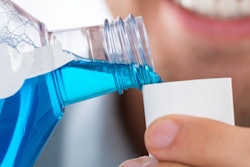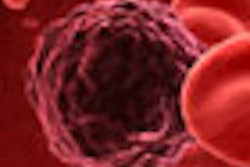Antibacterial agents commonly found in mouthwash have been found to act as anticancer agents, potentially providing novel uses for everyday chemical compounds, according to a new study in Angewandte Chemie (March 19, 2013).
The antibacterial and plaque-fighting compound chlorhexidine is a common mouthwash component, typically included as a 0.1% or 0.2% solution. Now, German researchers have found that chlorhexidine and a related compound alexidine inhibit oral cancer cells by blocking an important protein-protein interaction (PPI), according to a story in Scientific American. And since these compounds have already been approved by the U.S. Food and Drug Administration, the approval process for new uses may be shortened, the story noted.
Traditional drugs block single proteins, but there are many more PPIs than single proteins. There is great potential in developing drugs that interfere with these interactions, which are often upregulated in diseases such as cancer, but targeting PPIs is difficult.
The interaction between a group of proteins called the Bcl-2 family, which is present in all cells, has been well-studied. Apoptosis, or cell death, is sped up by proapoptotic proteins, while the other group of antiapoptotic proteins inhibits it. Normal cells usually have a balance of these two proteins, which bind together and regulate each other's function. This ensures that the cells are active when needed and abnormal cells are eliminated. This balance is disrupted in cancer, with the antiapoptotic proteins overexpressed and dominant. The antiapoptotic protein Bcl-Xl usually keeps its proapoptotic protein partner, Bak, bound up to prevent cell death, leading to uncontrolled cell division. Previous research has tried to find drug-like molecules and peptides that could block Bcl-Xl, but nothing has resulted in a clinically marketed drug.
In the current research, German researchers looked at about 4,000 everyday chemical compounds to find ones that might block the Bcl-Xl protein. They found that chlorhexidine and alexidine inhibited the Bcl-Xl and Bak interaction, and the compounds did so at a much lower concentration than is found in mouthwash. The researchers then tested the two compounds with tongue and pharynx cancer cells. They found that both significantly reduced the degree of apoptosis suppression in the cells.
The study findings may lead to a new class of compounds with promising anticancer properties, the story noted. So does using mouthwash lower the incidence of oral cancer? Literature on the relationship between mouthwash and oral cancer has been inconclusive, but the new findings may encourage further studies on the possible anticancer effects of mouthwash and its components, the story concluded.



















